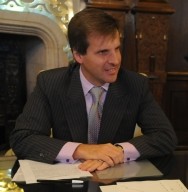Martin Redrado
Héctor Martín Pérez Redrado (born September 10, 1961 in Buenos Aires ) is an Argentine economist and politician. Since 2004 he has been chairman of the Central Bank of Argentina . He was removed from this post in 2009 by a decree of the Kirchner government . Whether it will come into force was an open question until Pedrado's resignation on January 29, 2010.
Life
Redrado studied economics at the Universidad de Buenos Aires and graduated from Harvard . As a partner of the Salomon Brothers , he subsequently advised several privatization projects ; including British Airways , British Gas , Compagnie Financière de Suez and Teléfonos de México .
In 1991 he returned to Argentina. Economy Minister Domingo Cavallo appointed him President of the Argentine Securities Commission (CNV). In 1992 he became President of the Emerging Markets Committee of the International Organization of Securities Commissions . In 1994 he was dismissed from office over differences over the privatization of the state-owned oil company YPF after he described Merrill Lynch and First Boston’s conduct on the matter as fraudulent. He subsequently founded the Fundación Capital think tank . In 1995 he was one of Time Magazine's 100 Leaders of the Next Millennium .
During the dot-com boom in 2000, he founded a securities trading website (the third in Argentina) which did good business despite the Argentina crisis . In 2002 he was awarded the post of State Secretary of the Ministry of Commerce under Eduardo Duhalde , whom he also held under his successor Néstor Kirchner . In September 2004 he left the Ministry to take the presidency of the Argentine Central Bank. He was confirmed in this position in December 2007 by President Cristina Fernández de Kirchner .
Due to the international financial crisis from 2007 onwards, the government was forced to mobilize foreign currency for the increasing public spending and foreign debt . The President requested an account with US $ 6.7 billion for this. Redrado severely criticized this decision and initially refused to implement it. As a result, he was removed from office by decree by the President and her cabinet.
Dismissal controversy
His dismissal provoked several debates in the Argentine National Congress . The legitimacy of the decree is currently being examined (as of January 2009) with reference to the nominal self-sufficiency of the central bank and the need for an emergency or urgency.
In a court ruling by judge María José Sarmiento , Redrado's position was confirmed that on the one hand Kirchner's proposed use of the reserves was illegal and on the other hand the impeachment should be annulled. The government announced that it would appeal the verdict. On January 29, 2010, he resigned from his post in writing.
Works
- Tiempos de desafíos , 1995
- Cómo sobrevivir a la globalización , 1999
- Exportar para crecer , 2003
Web links
- President dismisses central bank governor taz January 9, 2010
Individual evidence
- ↑ La Gaceta : Cristina echó a Redrado por decreto January 7, 2010
- ↑ World Bank Press: Argentina: From Insolvency to Growth 1993.
- ↑ El Cronista: El futuro presidente del BCRA ( Memento of the original from June 2, 2009 in the Internet Archive ) Info: The archive link was inserted automatically and has not yet been checked. Please check the original and archive link according to the instructions and then remove this notice. (September 2004)
- ^ La Nación: Pese al fallo en contra, el Gobierno presiona para depositar las reservas destinadas a pagar la deuda
- ↑ [faz.net]
| personal data | |
|---|---|
| SURNAME | Redrado, Martín |
| ALTERNATIVE NAMES | Pérez Redrado, Héctor Martín (full name) |
| BRIEF DESCRIPTION | Argentine economist and politician |
| DATE OF BIRTH | September 10, 1961 |
| PLACE OF BIRTH | Buenos Aires |
